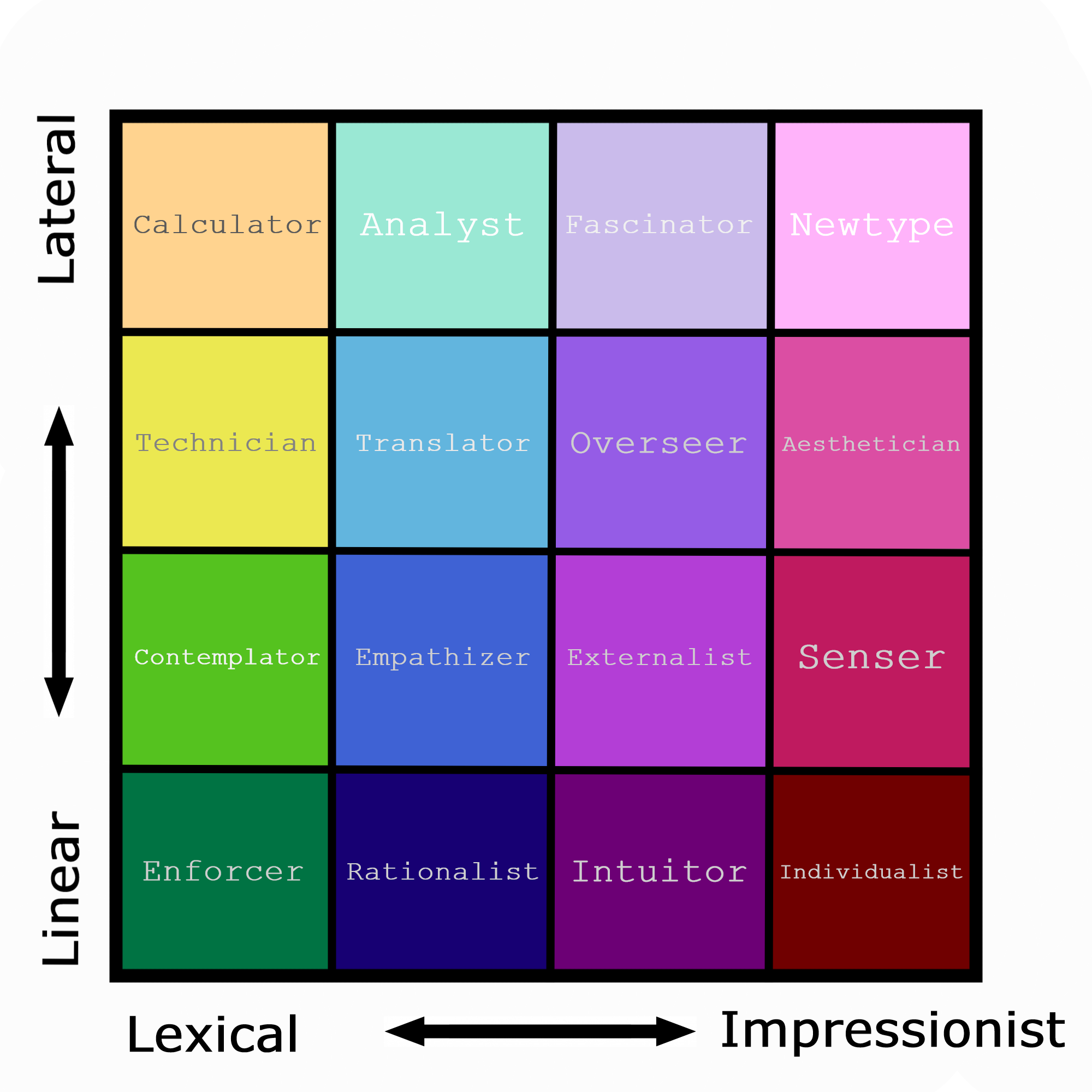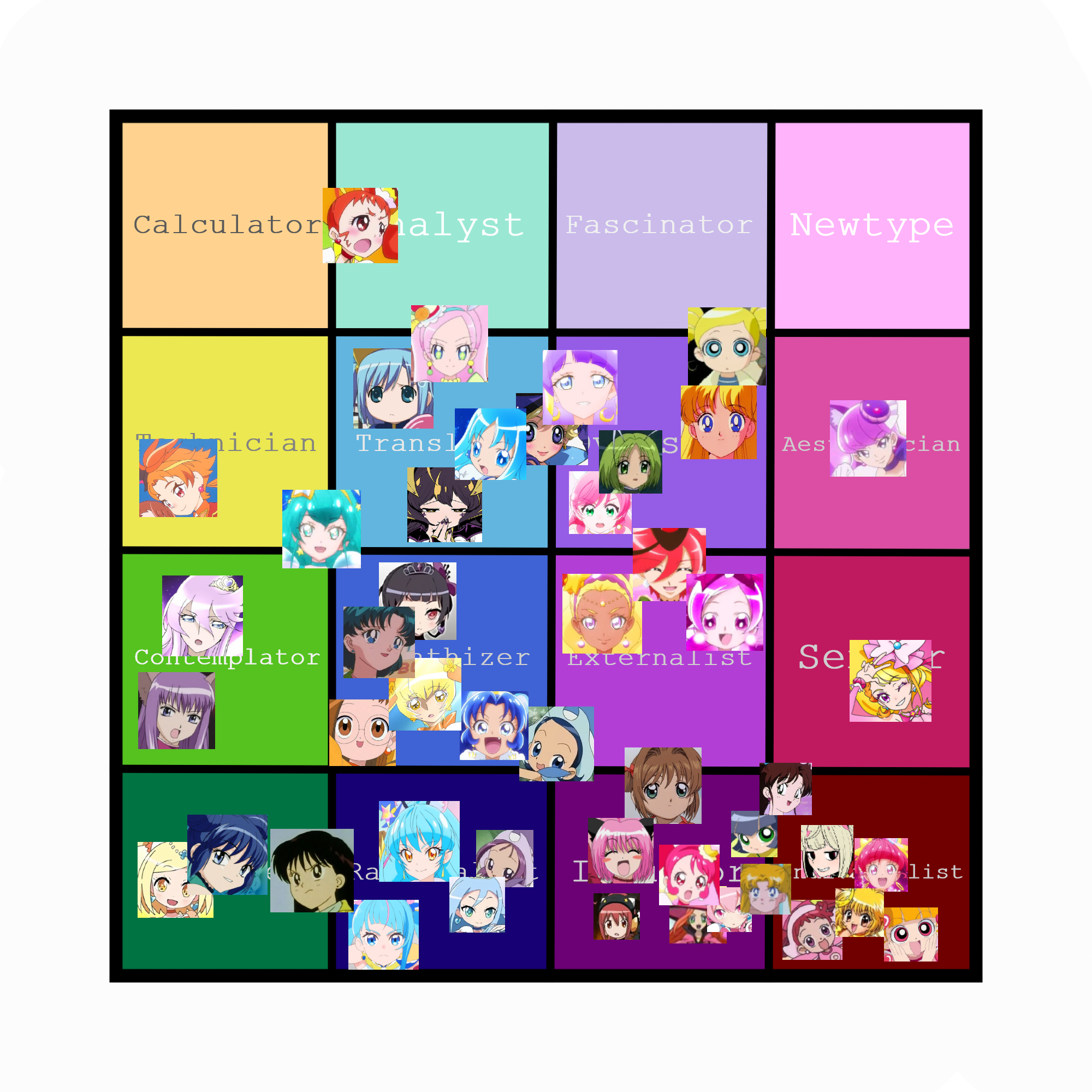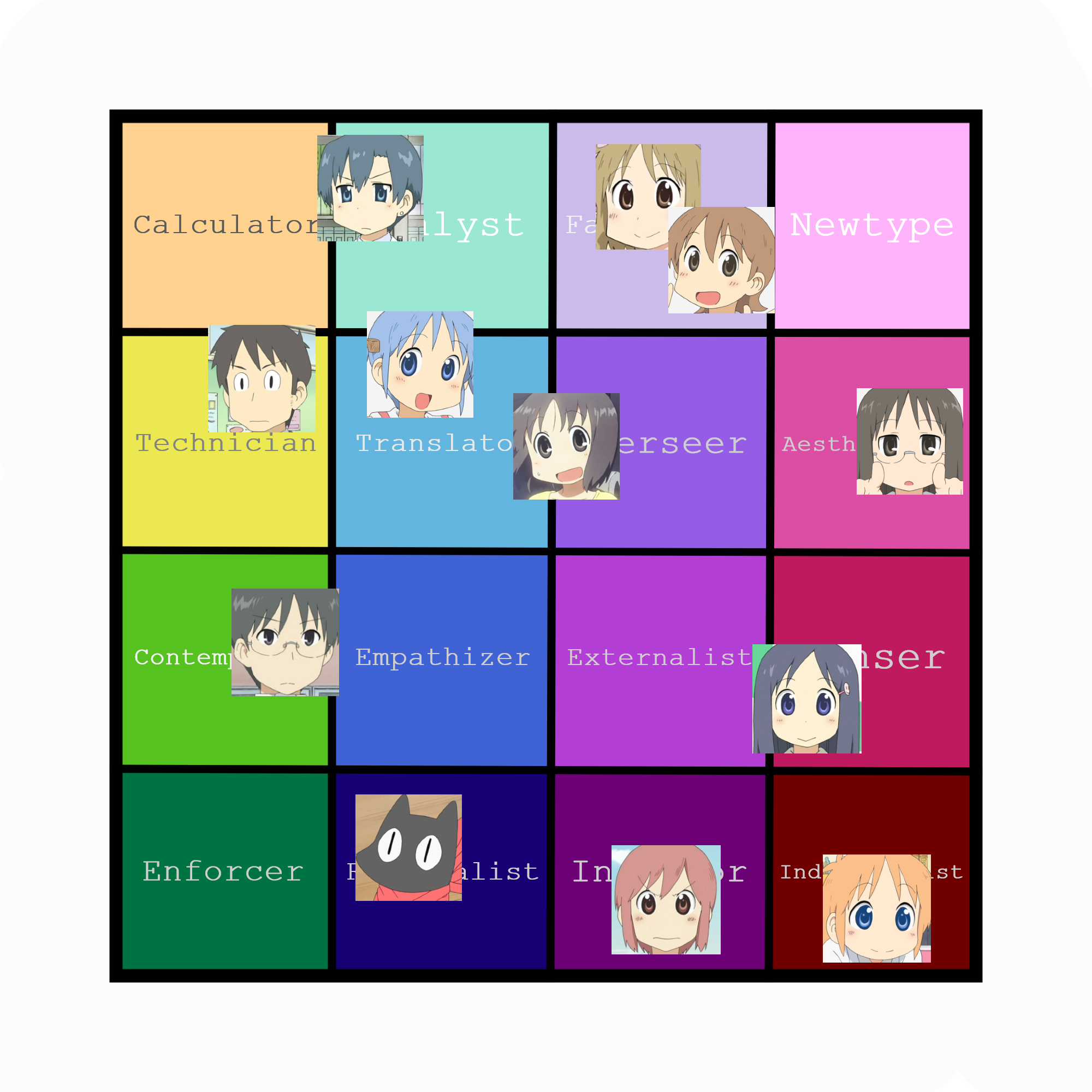


What the fuck is neurotyping? This is a chart that originates from this video. It is designed to answer one simple question: how think? Or, more accurately: how does this person or character process information and form thoughts?
What is this used for? What is the point? For me personally, I honestly just find it fun. When watching an anime, I like pondering how a character thinks, and how that relates to who they are as a character. It can provide insight into character dynamics and behaviors.
VERY important to note, though: THIS IS NOT A PERSONALITY CHART! This chart only deals with the question of how one processes information internally. It may correlate to how they tend to communicate with others, but it really has nothing to do with the personality of a character, or their hobbies, interests, or anything like that.
The chart on the left is one I made myself. It's the same chart, just with some different terms from the original that I think fit better, and with pretty colors. I have provided some charts with characters on them that I've made as well.
Below, I have provided my own definitions of everything on the chart and how it works if you're interested. What a character's neurotype is is a matter of opinion, and there are no correct answers. A character also does not have to fit into only one of the sixteen categories. The categories exist to help narrow things down. I have seen a 5x5 neurotype chart or two on the internet too.
AXES:
Linear versus Lateral (Vertical):
Linear thinkers focus on things one by one. Their thoughts follow through in a line, and they live in the moment, able to think clearly and quickly. They communicate in a straightforward way.
In contrast, lateral thinkers require effort to focus on a single thing at a time. Their thoughts are more scattered, and they spend more time in their own head, needing to organize to be understood. They communicate in a more disarranged way.
Lexical versus Impressionist (Horizontal):
Lexical thinkers are more comfortable using clear and specific language to convey their thoughts. They will be better than impressionists at understanding written or verbal explanations of things, but may have a harder time with abstract or metaphorical concepts.
In contrast, impressionist thinkers are more comfortable using alternative methods of communication to convey their thoughts. They will be better than lexicalists at getting a feel of things that aren't necessarily spelled out. However, they may have a harder time understanding things via explanation.
QUADRANTS:
Bottom Left (Lexical and Linear) - Ordinate: Will have relatively simple thought patterns that are able to be justified and explained through language.
Top Left (Lexical and Lateral) - Deciphering: Will decode their thoughts and outside information by putting language on it to make it understandable to them.
Bottom Right (Impressionist and Linear) - Instinctual: Will more often than not follow what they want to do without the need to explain themselves first.
Top Right (Impressionist and Lateral) - Chaotic: Have trouble explaining their complex thought patterns, and so they communicate using non-concrete methods.
ROWS:
4th Row (Highly Linear): Will focus on one thing at a time so much that they can sometimes have trouble considering other perspectives, and need to put effort in to listen and be open-minded.
3rd Row (Fairly Linear): Have relatively simple and organized thought patterns, and don't only think about things sequentially. Are usually able to think in a line, but they branch off into other ideas with ease.
2nd Row (Fairly Lateral): Relatively complex thought patterns, enough to the point that they will find it difficult to communicate in a straightforward way, but not enough to the point of always needing conscious effort to organize their ideas.
1st Row (Highly Lateral): Will require voluntary work to form cohesion in their heads by sorting and connecting the thoughts from the amorphous cloud of fog that they originate.
COLUMNS:
1st Column (Highly Lexical): Need clearly defined language in order to be able to understand ideas. They will always have difficulty understanding impressionistic thinking until they can adequately describe it with concrete lexemes.
2nd Column (Fairly Lexical): Are able to understand impressionistic thinking, even though they are lexical thinkers themselves. It will help to put things into words, but it is not always necessary.
3rd Column (Fairly Impressionist): Able to understand lexical thinking, but will find it more difficult to express their own thoughts lexically, and prefer to get a feel for things instead.
4th Column (Highly Impressionist): Will always have difficulty understanding anything through written or verbal explanation. They are unable to express themselves through clearly defined terms, so they do it with other methods.
CATEGORIES:
These are what the categories TEND TO be, I just don't want to write "tend to" every single time.
Enforcer: Have a big focus on rules. They stick to how they think things should be. Often hold others to their own standard of how they believe things ought to work. They are very good at staying on the task at hand and dealing with concrete terms.
Contemplator: Think things through more in their head rather than blindly following rules. They will stay quiet while thinking and then verbalize conclusions. Keep to themselves.
Technician: Will think outside the box more, and therefore will be good at coming up with new ideas and solving problems. Don't require as much brain organization as calculators, but as a result, they are usually open-minded and/or thoughtful, although still having a difficult time understanding impressionists.
Calculator: So many thoughts in their head that they have to try to connect them together by using specific organization techniques. Instead of focusing on rules as an ought, they need to make up their own thought web through specific language in order to think clearly. Require very clear lexemes to understand others so they can place the new information in their head somewhere that fits.
Rationalist: Tend to do their own thing and think their own way, but are much more able to understand impressionists than Enforcers are. Therefore they have more room to consider other perspectives, but will still be steadfast in their own agenda.
Empathizer: The easiest to get along with. Will understand lexicalists and impressionists, as well as linear thinkers and lateral thinkers, like all the categories in the middle, but they will be the best at verbalizing responses and condensing information down into simple, easy to digest pieces.
Translator: Will understand most of the chart, like Empathizers, but Translators won't be as good at condensing information. Their thoughts are more scattered, but not scattered to the point of needing to put conscious effort into organizing them all.
Analyst: Have tons of thoughts in their head, and like Calculators, need to organize them all with language in order to fully understand them. However, unlike Calculators, they will be able to understand impressionist thinkers. Analysts don't necessarily always require very clear language in order to understand, but they will still have to analyze and put words on it, often by writing things down.
Intuitor: Will trust in their heart. They do what they want, but not to the point that they won't consider other perspectives. Like Rationalists, but instead of doing what they THINK is right, Intuitors will do what they FEEL is right. They are more guided by their emotions.
Externalist: Are like Empathizers, but aren't as good at finding the right words. Externalists are very understanding people, and they will comfort others around them emotionally rather than with practical solutions. Their thoughts are fairly linear, and they won't have a tremendously difficult time finding words, but enough so to the point of expressing themselves in different ways.
Overseer: The combination of being fairly lateral and fairly impressionist means that Overseers, while capable of understanding everyone on the chart, will find it more difficult to speak. They consider what others are saying and listen as well as Externalists, but Overseers require work to sort through their thoughts and have much more difficulty with verbalizing, and as a result they prefer to stay quiet more often than not.
Fascinator: So lateral that they are all over the place, but instead of that translating to very specific and numerous verbalizations, as with Analysts, it will translate to them finding other ways to express their rampant thoughts, such as body language or simply noises. They can talk a lot, but when they do it's with much less clearly defined language.
Individualist: Simply do whatever they feel like without giving a single thought to rules. Like all highly impressionistic thinkers, they probably won't bother with even trying to explain their thoughts via clear lexemes, and like all highly linear thinkers, are solely focused on one thing at a time. This makes them incredibly difficult to reason with.
Senser: Will also do what they want, but Sensers aren't as singular-minded as Individualists. They will usually stand out in a group in some way, either because of their identity, or because they just do their own thing. They're not interested in conveying why they do what they do with words, but they are much more willing to listen to other impressionists, being in one of the middle two rows.
Aesthetician: Like Overseers, they are impressionist, and fairly lateral, so they have more thoughts to organize and less of a way to convey them. But Aestheticians are highly impressionist, so instead of struggling to find the right words to convey their fairly complex thoughts, they don't even bother. As a result, they will tend to be much quieter people, even being often silent in some cases, and express themselves in more metaphorical ways.
Newtype: They have tons of thoughts raging in their head, and no ability (and in some cases, even interest) to convey them through words. This can either mean that they stay totally silent, completely shut off in their own minds, or they simply stop caring entirely and spout out whatever makes sense to them, which will most likely end up sounding like total nonsense to everyone else.